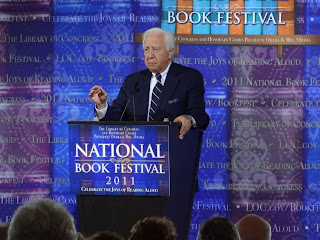Like last year's event, which was my first, I found this year's Festival (the first time it went for two days - well, technically, one and one-half) intellectually stimulating. It is the rare opportunity to step out of the daily humdrum and move into that rarefied atmosphere where authors talk to interested audiences.

I have had my share of talking in front of interested audiences this last year and a half - having had the wonderful opportunity to talk to audiences interested in our nation's First Ladies, and particularly those who are interested in hearing about the nation's youngest First Lady, Frances Folsom Cleveland.
The fact that book reading is still something of a dying art is encapsulated in a remark I overheard Washington Post reporter and author, Joel Achenbach, say to some friends of his who were seated in the row in front of me: "This is not a bad turnout. And these people buy books."
Perhaps David McCullough, who came as close to being classified as a "keynote speaker" as any of those who spoke this year, summarized it best, when he strongly asserted his views that the ability to discuss and research and read others' works was part of what is essential to keeping a democracy thriving and healthy.

Indeed it is essential to keeping us healthy - a point that McCullough also made sure to make as the last speaker in the "History and Biography" pavilion on the Mall at the festival's close on Sunday afternoon. He observed that on the day after the 9/11 attacks, he entered the offices of James Billington, the Librarian of Congress, and asserted that the book festival needed to be kept alive, if for no other reason than to assert that we are a nation that does not tell others how to think.
This comment drew rousing applause by the audience, but in reviewing the speakers in what I will call the "non-fiction" pavilions (History & Biography, and Contemporary Life - where I spent all of my time at the Festival), I noticed that there is a subtle undercurrent that suggests a train of thought that we should be following. There is an overemphasis on looking at the issues that face Black America, an obsession with the Civil War, and an almost morbid fascination with those who have faced serious battles with disease.
While none of these topics are, in and of themselves, inappropriate for inclusion in a book festival, it becomes something of a question mark when there are multiple entries that fit into this category. The " Big C" has captured a lot of attention, and perhaps I should simply write off the fascination with issues of race and the Civil War as part of the homage being paid to the 150th anniversary of the start of the Civil War. However, in my middle-aged naivete, I would still like to believe that there is more beyond the literary horizon than this narrow band of topics covered in this year's festival.
Last year's festival, the first which I attended, energized me beyond description. The range of topics was much more expansive, covering everything from the new biography of Cleopatra to a presentation on the possibilities offered to our society by the wonders of engineering. Former First Lady Laura Bush spoke (her memoir having just been published), a fitting inaugural to my first attendance, since the book festival was initially her idea - taken from something she had started in Texas when she was that state's first lady.

We are a nation of far-reaching ideas - still ever optimistic and hopeful. As I noted on the survey I returned to the Library of Congress, the title of the event is the "NATIONAL" Book Festival, and I hope this Atlantic-to-Pacific scope will be remembered as activities get under way to secure next year's speakers.